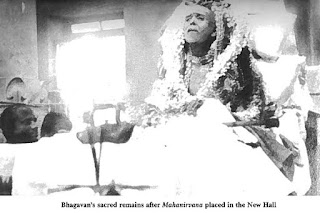These photos are scanned from Arunachala's Ramana Volume VIII Book.
Many thanks to Ramana Ashramam for allowing devotees like us to have a darshan of Sacred Remains Of Bhagavan.


My Friend Subramanian R wants to add few more points
The photo is after keeping the mortal remains of Bhagavan Ramana,in a sitting position and many people garlanded Him and applied sandal paste and vibhuti. Then, in the sitting posture, the mortal remains were descended inside the Samadhi pit before it was closed with granite plates. The Brahma Jnani who never permitted anyone to garland Him while He was in body, His body was profusely garlanded for the Samadhi ceremonies.
Annamalai Swami had been asked by Him not to come to the Asramam,since a year before, and so,he did not see Him or His merger with Arunachala. Nor did he attend the ceremonies.He continued his atma vichara dhyana in his cottage in Palakottu.He had an acute stomach pain for the previous three days and after seeing the shooting star perching on Arunachala, from his terrace,his stomach pain vanished! He simply went downstairs and was sitting in a mood of melancholy.Someone came to his cottage to take a bath,after the ceremonies.He hugged that visitor and took some rose petals that were sticking on his body and ate them!
No one has photographed the shooting star. There were of course,many photographers including some from West.
Many thanks to Ramana Ashramam for allowing devotees like us to have a darshan of Sacred Remains Of Bhagavan.
My Friend Subramanian R wants to add few more points
The photo is after keeping the mortal remains of Bhagavan Ramana,in a sitting position and many people garlanded Him and applied sandal paste and vibhuti. Then, in the sitting posture, the mortal remains were descended inside the Samadhi pit before it was closed with granite plates. The Brahma Jnani who never permitted anyone to garland Him while He was in body, His body was profusely garlanded for the Samadhi ceremonies.
Annamalai Swami had been asked by Him not to come to the Asramam,since a year before, and so,he did not see Him or His merger with Arunachala. Nor did he attend the ceremonies.He continued his atma vichara dhyana in his cottage in Palakottu.He had an acute stomach pain for the previous three days and after seeing the shooting star perching on Arunachala, from his terrace,his stomach pain vanished! He simply went downstairs and was sitting in a mood of melancholy.Someone came to his cottage to take a bath,after the ceremonies.He hugged that visitor and took some rose petals that were sticking on his body and ate them!
No one has photographed the shooting star. There were of course,many photographers including some from West.





